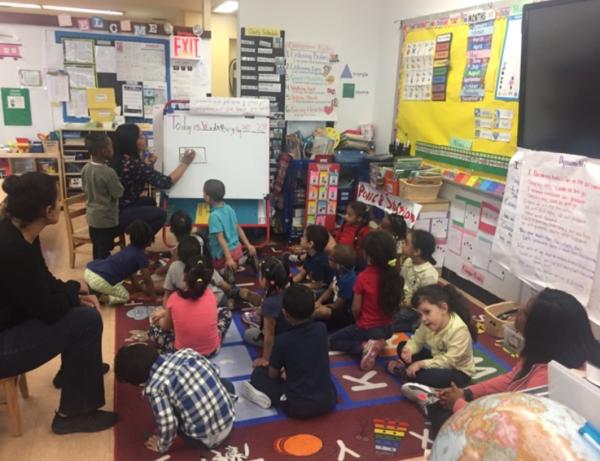
A prekindergarten class like this was the focus of the CCNY-Columbia study redefining high-quality early learning.
New research from The City College of New York and Teachers College at Columbia University illustrates seven principles of practice that offer an expanded definition for “high-quality early learning.” The study recognizes the promise and possibility of children's lives, ensuring that the lived experiences of those who have historically been underserved and the growing numbers of multilingual children and children of color nationally are represented in their learning environments.
Beverly Falk of City College’s School of Education and Mariana Souto-Manning (Teachers College) led a team on a year-long study of nine prekindergarten classrooms representing three different socioeconomic communities in New York City. Their findings, in a report entitled, “Quality UPK Teaching in Diverse Settings,” and an accompanying video, “Principles for Advancing Equity in NYC UPKs,” illustrate practices, behaviors, and attitudes that are increasingly important as early childhood classrooms become more diverse and as New York City makes good on its promise that children from all backgrounds receive high-quality learning opportunities.
The research was informed by bringing together concepts from the science of early learning, culturally responsive/relevant pedagogy, and multilingual development into seven core principles:
- All children can learn;
- Their learning is varied;
- They are active and multimodal meaning makers;
- They have diverse, fluid, and flexible language practices;
- Their sociocultural contexts are assets and valuable resources for learning;
- They are critical thinkers and inquirers; and,
- They learn within the context of caring and reciprocal relationships.
Qualitative research was used to identify tangible teaching strategies, tools, and approaches that represent the principles.
“The primary contribution of this research lies in the observable behaviors described in the principles,” said Souto-Manning. “From the way that teachers incorporate children’s cultures and languages into the curriculum and how reflective of families and communities classroom materials are, to fostering advocacy or providing nutrition supports and culturally-relevant family engagement opportunities—these approaches position a child’s family and community as central to their learning and development.”
Importantly, the researchers found that the quality of teaching in classrooms was determined by the degree to which educators enacted these principles, rather than only by formal instructional tools and the communities’ available resources, demographics, and/or socioeconomic status. This finding is timely as the COVID-19 pandemic has made it necessary for learning to increasingly take place in children’s homes and communities rather than in classrooms.
“As our city, state, and country continue to face the impacts of COVID-19, it is significant to note that we observed the principles of high-quality early learning being enacted in all the different demographic communities,” said Falk.
This research, funded by the Foundation for Child Development, provides a framework that the authors recommend for use in the professional learning of early childhood educators.
About the City College of New York
Since 1847, The City College of New York has provided a high-quality and affordable education to generations of New Yorkers in a wide variety of disciplines. CCNY embraces its position at the forefront of social change. It is ranked #1 by the Harvard-based Opportunity Insights out of 369 selective public colleges in the United States on the overall mobility index. This measure reflects both access and outcomes, representing the likelihood that a student at CCNY can move up two or more income quintiles. In addition, the Center for World University Rankings places CCNY in the top 1.8% of universities worldwide in terms of academic excellence. Labor analytics firm Emsi puts at $1.9 billion CCNY’s annual economic impact on the regional economy (5 boroughs and 5 adjacent counties) and quantifies the “for dollar” return on investment to students, taxpayers and society. At City College, more than 16,000 students pursue undergraduate and graduate degrees in eight schools and divisions, driven by significant funded research, creativity and scholarship. CCNY is as diverse, dynamic and visionary as New York City itself. View CCNY Media Kit.